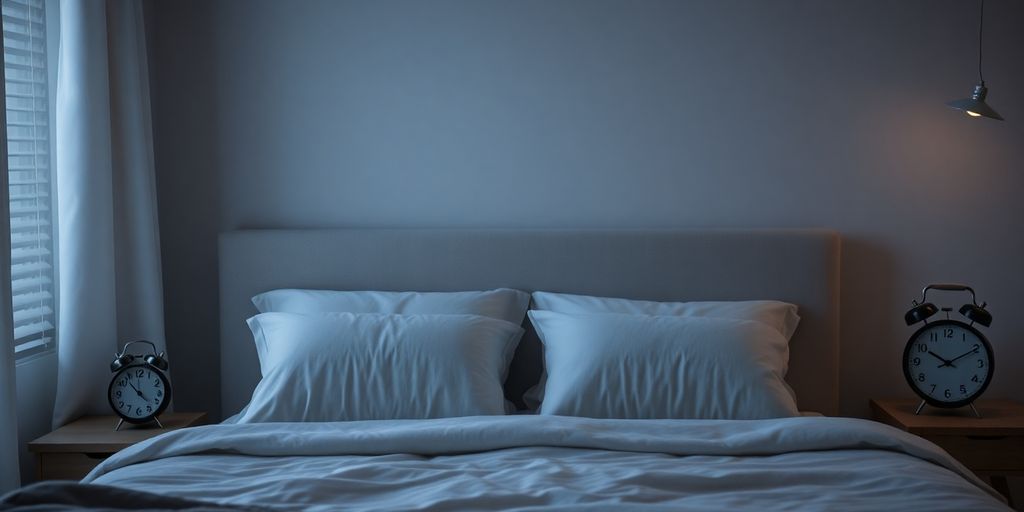Ever found yourself tossing and turning at night, wondering why sleep just won’t come? You’re not alone. Sleep disorders mess with more people than you might think. They can make you feel tired all day, mess with your mood, and even affect your health. This article breaks down the causes, symptoms, and treatments of sleep disorders, giving you a clearer picture of what might be keeping you up at night.
Key Takeaways
- Sleep disorders are more common than you’d think, affecting millions worldwide.
- They can lead to daytime fatigue, mood swings, and health issues.
- Causes range from genetics to lifestyle choices and medical conditions.
- Diagnosis often involves sleep studies and professional assessments.
- Treatments include therapy, medication, and lifestyle changes.
Overview of Sleep Disorders
Definition of Sleep Disorders
Sleep disorders are conditions that disrupt your regular sleep patterns. They can affect how you fall asleep, how you stay asleep, or even how you feel when you wake up. These disorders can range from mild disturbances to severe disruptions that interfere with daily life. Some people might have trouble falling asleep, while others might wake up too early or feel exhausted despite a full night of rest.
Prevalence of Sleep Disorders
Sleep disorders are more common than you might think. According to various studies, a significant portion of the population struggles with sleep-related issues at some point in their lives. In fact, millions of people worldwide are affected by different types of sleep disorders. This can include insomnia, sleep apnea, and restless legs syndrome, among others. Understanding the prevalence helps in recognizing the importance of addressing these issues.
Impact on Daily Life
The impact of sleep disorders on daily life can be profound. Lack of proper sleep affects your mood, energy levels, and overall health.
- Mood Changes: Sleep deprivation can lead to irritability and mood swings.
- Cognitive Decline: It can impair your ability to think clearly and make decisions.
- Physical Health: Chronic sleep issues are linked to various health problems like obesity, diabetes, and heart disease.
Without adequate sleep, your body and mind can’t function at their best. It’s like trying to drive a car on an empty tank – you might get somewhere, but not very far or very well.
Common Types of Sleep Disorders

Insomnia
Insomnia is probably the sleep disorder most people have heard of. It’s when you just can’t fall asleep or stay asleep, no matter how tired you are. Some folks toss and turn all night, while others wake up way too early and can’t drift back off. Stress, anxiety, and even certain medications can make insomnia worse. For some, it’s a temporary thing, but for others, it can become a chronic issue that seriously messes with their daily lives.
Sleep Apnea
Sleep apnea is a bit more serious. It happens when your breathing stops and starts during sleep. Often, this is because your throat muscles relax too much. You might snore loudly, or wake up gasping for air. Obstructive sleep apnea is the most common type. Left untreated, it can lead to other health problems like high blood pressure or heart issues. Many people use a CPAP machine, which helps keep the airway open, to manage this condition.
Restless Legs Syndrome
Restless legs syndrome (RLS) is exactly what it sounds like. It’s a condition that causes an uncontrollable urge to move your legs, usually because of an uncomfortable sensation. This often happens in the evening or nighttime hours when you’re trying to relax or sleep. The constant need to move can make it hard to drift off, leading to daytime fatigue. Some say it feels like something is crawling under their skin, while others describe it as a tingling or aching sensation.
Sleep disorders can significantly affect one’s quality of life, impacting both physical and mental health. Recognizing the symptoms early and seeking appropriate treatment can make a world of difference.
Causes of Sleep Disorders
Understanding why sleep disorders occur can help us manage them better. Here, we explore some of the common causes.
Genetic Factors
Genetics can play a big role in sleep disorders. If your parents or siblings have a sleep disorder, you might be more likely to have one too. Researchers are digging into the DNA to find out exactly how our genes mess with our sleep. Some studies suggest that certain gene mutations might be linked to conditions like insomnia or sleep apnea.
Lifestyle Influences
Our daily habits can really mess with our sleep. Things like irregular work hours, stress from a fast-paced life, or even too much screen time before bed can lead to poor sleep. For instance, people working night shifts often find it tough to get quality rest. Similarly, using phones or computers late at night can trick our brains into staying awake longer than we should.
- Irregular work schedules can disrupt natural sleep patterns.
- Stress from daily life can keep the mind too active at night.
- Excessive screen time before bed can interfere with falling asleep.
Medical Conditions
Sometimes, other health issues can cause sleep disorders. Conditions like asthma, depression, or even heart disease can make it hard to get a good night’s sleep. Medications for these illnesses might also affect sleep quality. For example, certain antidepressants can cause insomnia as a side effect.
It’s important to consider how underlying health problems might be affecting your sleep. Addressing these can often improve sleep quality.
In some cases, exploring natural solutions for sleep issues might be beneficial, especially when these disorders are linked to lifestyle or medical conditions. Consulting with a healthcare professional can provide guidance on using such remedies safely and effectively.
Symptoms of Sleep Disorders

Sleep disorders can throw a wrench into your daily life, causing a range of symptoms that might leave you feeling out of sorts. Understanding these symptoms can be the first step toward finding a solution.
Difficulty Falling Asleep
One common sign of a sleep disorder is trouble drifting off to sleep. You might find yourself tossing and turning for hours, unable to shut off your mind. This can be incredibly frustrating and lead to feelings of anxiety about bedtime.
Daytime Fatigue
Feeling tired during the day is a hallmark of sleep disorders. No matter how long you stay in bed, you might still wake up feeling groggy and unrefreshed. This can affect your ability to concentrate, make decisions, and even impact your mood.
Mood Changes
Sleep disorders often come hand in hand with mood swings. You might notice you’re more irritable or prone to sadness. Lack of sleep can amplify stress and make it harder to cope with everyday challenges.
"When sleep is elusive, everything else seems just a bit harder. From focusing at work to enjoying time with family, sleep disorders can cast a long shadow over daily life."
In some cases, incorporating CBD products into your bedtime routine might help improve sleep quality by addressing anxiety and stress, which are common sleep disruptors.
Diagnosing Sleep Disorders
Sleep Studies and Tests
Diagnosing sleep disorders often starts with a sleep study, also known as polysomnography. This test records your brain waves, oxygen levels, heart rate, and breathing as you snooze. Doctors use this info to figure out what’s messing with your sleep. Sometimes, a home sleep test might be suggested, especially if sleep apnea is suspected. These tests are less comprehensive but can still provide valuable insights.
Role of Sleep Specialists
When it comes to sleep issues, a sleep specialist can be a game-changer. These pros are trained to spot the nuances of various sleep disorders. They’ll review your sleep history, study test results, and maybe even suggest lifestyle tweaks. Seeing a specialist can make a big difference, especially if your symptoms are tricky or if previous treatments haven’t worked.
Self-Assessment Techniques
You can also play a role in diagnosing your sleep troubles. Keeping a sleep diary is a simple way to track your sleep patterns and habits. Note down when you go to bed, wake up, and how you feel during the day. This info can highlight patterns or triggers that you might not notice otherwise. Additionally, self-assessment questionnaires can help identify symptoms of common sleep disorders, like insomnia or restless legs syndrome.
Sleep disorders can be complicated, but getting the right diagnosis is the first step toward better sleep. With the right info and help, you can start to tackle the problem head-on.
Treatment Options for Sleep Disorders

Cognitive Behavioral Therapy
Cognitive Behavioral Therapy (CBT) is often the first line of treatment for sleep disorders like insomnia. It’s all about changing the way you think and act around sleep. CBT can help you identify and change thoughts and behaviors that cause or worsen sleep problems. It usually involves meeting with a therapist weekly for several months. CBT has been proven to be as effective as medication for many people.
Medications and Supplements
Sometimes, medications or supplements are necessary to manage sleep disorders. Doctors might prescribe sleeping pills for short-term use or recommend over-the-counter options like melatonin. It’s important to use these under guidance, as they can have side effects or lead to dependency. Melatonin is a popular choice because it’s a natural hormone that helps regulate sleep-wake cycles.
Lifestyle Modifications
Lifestyle changes can make a big difference in managing sleep disorders. Here are some tips:
- Stick to a regular sleep schedule, even on weekends.
- Create a relaxing bedtime routine to signal your body it’s time to wind down.
- Avoid caffeine and heavy meals before bed.
Sometimes, the simplest changes in your daily habits can have the biggest impact on your sleep quality. Adjusting your lifestyle might take time, but it’s often worth the effort.
The Role of Diet and Nutrition
Foods That Promote Sleep
Ever noticed how some foods just make you feel sleepy? Well, there’s a reason for that. Foods rich in tryptophan, like turkey and cheese, can help your body produce melatonin, the hormone that regulates sleep. Bananas and almonds are also great because they’re packed with magnesium, which helps relax your muscles.
Here’s a quick list of sleep-friendly foods:
- Turkey: High in tryptophan.
- Almonds: Full of magnesium.
- Bananas: Provide magnesium and potassium.
Nutritional Deficiencies
Sometimes, not getting enough sleep is linked to what you’re not eating. If you’re low on iron or vitamin D, you might find it hard to get a good night’s rest. Iron helps carry oxygen in your blood, and without enough of it, you might feel tired all the time. Vitamin D, on the other hand, plays a role in sleep regulation. So, if you’re having trouble sleeping, it might be worth checking if you’re getting enough of these nutrients.
Impact of Caffeine and Alcohol
We all love our morning coffee, but too much caffeine can seriously mess with your sleep. It’s a stimulant, so it keeps your brain awake when it should be winding down. Try to cut off caffeine by early afternoon to avoid this. Alcohol might make you feel sleepy initially, but it can disrupt your sleep cycle later in the night.
Getting the right nutrients can make a big difference in how well you sleep. Think of food as one of your tools for better rest.
The Importance of Sleep Hygiene
Creating a Sleep-Friendly Environment
Setting up your bedroom for better sleep isn’t rocket science, but it’s super important. A cool, dark, and quiet room can make a world of difference in how well you sleep. Think about blackout curtains to keep the light out, or maybe a white noise machine if your neighborhood is noisy. Also, keep your room cool—around 60-67°F is ideal.
Establishing a Bedtime Routine
Getting into a bedtime routine is like telling your brain it’s time to chill out. Try doing the same things every night, like reading a book or taking a warm bath. It’s about winding down and telling your body that sleep is coming. Consistency is key, so aim to go to bed and wake up at the same time every day—even on weekends.
Limiting Screen Time
We all love our gadgets, but they might be messing with our sleep. The blue light from screens can trick your brain into thinking it’s daytime, making it harder to fall asleep. Try to turn off screens at least an hour before bed. Instead, maybe grab a book or listen to some calming music.
Making small changes to your nighttime habits can lead to big improvements in sleep quality. It might take some time, but stick with it, and you’ll likely see a difference.
And hey, if you’re struggling with sleep disorders like insomnia or sleep apnea, there are options out there. Some folks find that using CBD products, like oils or gummies, can help manage their sleep issues. Just make sure to consider the right dosage and product type for your needs.
Alternative and Complementary Therapies
Exploring alternative and complementary therapies can open up new avenues for managing sleep disorders. These approaches often focus on holistic healing and can be used alongside traditional treatments.
Herbal Remedies
Herbal remedies have been used for centuries to promote better sleep. Valerian root, chamomile, and lavender are popular choices. These herbs are believed to have calming effects that can help ease anxiety and improve sleep quality. Valerian root is particularly noted for its potential to reduce the time it takes to fall asleep. However, it’s important to consult with a healthcare provider before starting any herbal supplements, as they can interact with other medications.
Acupuncture and Acupressure
Acupuncture and acupressure are traditional Chinese medicine techniques that involve stimulating specific points on the body. These methods are thought to balance the body’s energy and promote relaxation. Some people find that these therapies help reduce insomnia symptoms and improve sleep quality. Regular sessions might be needed to experience the full benefits, and it’s crucial to find a qualified practitioner.
Mindfulness and Meditation
Mindfulness and meditation can be powerful tools for managing sleep disorders. These practices encourage relaxation and help reduce stress, which is often a barrier to good sleep. Techniques such as deep breathing, guided imagery, and progressive muscle relaxation can be incorporated into a nightly routine. Practicing mindfulness regularly can lead to improved sleep patterns over time.
Embracing these therapies requires patience and consistency. They may not provide immediate results, but over time, they can contribute to a more restful night’s sleep. Integrating these practices into your daily life can also lead to improvements in overall well-being.
For those considering alternative options, CBD may offer a natural solution for improving sleep quality. It interacts with the body’s endocannabinoid system, potentially easing anxiety and pain, common barriers to restful sleep. Always consult with a healthcare provider before incorporating new treatments into your routine.
The Connection Between Mental Health and Sleep Disorders
Anxiety and Sleep
Anxiety can often lead to a vicious cycle with sleep issues. When you’re anxious, your mind races, making it hard to drift off. This lack of sleep can then ramp up anxiety levels, creating a loop that’s tough to break. Managing anxiety is key to improving sleep quality. Techniques like deep breathing, meditation, or sometimes therapy can help ease the mind before bedtime.
Depression and Sleep
Depression and sleep problems often go hand in hand. You might find yourself sleeping too much or too little. This inconsistency can worsen depressive symptoms, making it feel like you’re stuck in a fog. A regular sleep schedule can help, along with professional help if needed. Medications or therapy might be recommended by a doctor.
Stress Management Techniques
Stress is another big player when it comes to sleep troubles. It can keep you tossing and turning all night. Here are some ways to manage stress before bed:
- Journaling: Write down your thoughts to clear your mind.
- Exercise: Even a short walk can help reduce stress.
- Relaxation techniques: Try yoga or stretching to unwind.
Sleep and mental health are closely linked, affecting each other in significant ways. Addressing one can often lead to improvements in the other.
The Impact of Technology on Sleep
Blue Light Exposure
In our tech-driven world, blue light exposure is a big deal. All those hours staring at screens? They mess with our sleep. Blue light tricks our brains into thinking it’s daytime, messing with our natural sleep cycle. It’s like our internal clock gets confused, leading to trouble falling asleep.
Social Media and Sleep
Social media’s a double-edged sword. Sure, it’s great for staying connected, but it can also keep us up all night. Scrolling through endless feeds, chasing the next like or comment, it’s addictive. This constant engagement keeps our minds active when they should be winding down.
Digital Detox Strategies
Finding balance is key. A digital detox can help reset our sleep patterns. Here are some simple steps:
- Set a nightly screen curfew an hour before bed.
- Swap your phone for a book or meditation.
- Use apps that limit screen time.
Taking a break from technology isn’t just good for sleep; it clears your mind and reduces stress. It’s about finding a healthy relationship with our devices.
In today’s fast-paced world, exploring natural solutions like CBD for sleep is gaining traction. It’s a growing interest that addresses common sleep struggles, offering insights into its benefits for improving restfulness.
Future Directions in Sleep Disorder Research

Innovations in Sleep Technology
Sleep technology is advancing rapidly, bringing new gadgets and tools into our bedrooms. Smart mattresses, for instance, can adjust firmness levels based on your sleep patterns. Meanwhile, wearable devices track sleep stages and provide feedback on how to improve your rest. These innovations are not just about comfort but also about understanding sleep disorders better.
Genetic Research
Genetic research is opening new doors in understanding sleep disorders. Scientists are identifying specific genes linked to conditions like insomnia and sleep apnea. This research could lead to targeted treatments, offering hope for those who struggle with chronic sleep issues. It’s a complex field, but the potential benefits are huge.
Public Health Initiatives
Public health initiatives are crucial in addressing sleep disorders on a larger scale. Programs aimed at educating the public about the importance of sleep hygiene can make a big difference. These initiatives often include campaigns to reduce screen time before bed and promote regular sleep schedules. It’s about creating a culture that values sleep as a vital part of health and wellness.
As we look to the future, the intersection of technology, genetics, and public health holds promise for transforming how we understand and treat sleep disorders. The journey is ongoing, but each step brings us closer to better sleep for everyone.
Wrapping It Up
So, there you have it. Sleep disorders are more common than you might think, and they can really mess with your daily life. From insomnia to sleep apnea, these issues can sneak up on anyone. But the good news? There are ways to tackle them. Whether it’s through lifestyle changes, therapy, or medication, there’s hope for better sleep. It’s all about finding what works for you and sticking with it. So, if you’re struggling with sleep, don’t just brush it off. Talk to a doctor, try out some new habits, and give yourself the chance to rest easy. After all, a good night’s sleep is worth its weight in gold.
Frequently Asked Questions
What are sleep disorders?
Sleep disorders are problems with sleeping, like trouble falling asleep or staying asleep. They can affect how you feel and act during the day.
How common are sleep disorders?
Many people have sleep disorders. Millions of people in the U.S. alone deal with them every year.
Why is sleep important?
Sleep helps your body and mind rest and recharge. Without enough sleep, you might feel tired and grumpy.
Can sleep disorders be treated?
Yes, many sleep disorders can be treated with changes in habits, therapy, or medicine.
What causes sleep disorders?
Sleep disorders can be caused by stress, poor sleep habits, or health problems. Sometimes, it’s also in your genes.
How do I know if I have a sleep disorder?
If you often have trouble sleeping or feel very tired during the day, you might have a sleep disorder. It’s a good idea to talk to a doctor.
What is sleep hygiene?
Sleep hygiene means having good habits that help you sleep well, like going to bed at the same time every night.
Can technology affect my sleep?
Yes, using phones or computers before bed can make it harder to fall asleep because of the light they give off.






